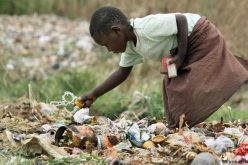The humanitarian organization Save the Children has released its annual State of the World’s Mothers report. It says despite much progress being made in reducing maternal and child deaths, every year, three million babies die within the first month of life. Many just live a few hours.Save the Children President and CEO Carolyn Miles said there’s a widespread and mistaken belief that little can be done to save newborn lives in developing countries. As a result, many babies die.
“This year’s report we really focused in on newborns. And we found that a baby’s birthday is actually the most dangerous day of their life. More than one million babies are dying the actual day that they’re born.”
There are several reasons why they’re so at risk that first day.
“It’s when they can die of very preventable things. So babies are dying of infection. They’re dying of complications at premature birth and they’re dying of very simple things like not breathing at birth,” she said.
Miles said one region of the world stands out as being the worst for newborns.
“Sub-Saharan Africa is the place where this is the biggest issue. And if you look at the index that we put together, the bottom 10 in that index are all sub-Saharan African countries. From a percentage standpoint that’s where the most babies are dying.”
Forty percent of first day newborn deaths are in sub-Saharan Africa.
Of the 176 countries that are ranked in the Mothers Index, DRC is at the very bottom. Rounding out the bottom 10 are Somalia, Sierra Leone, Mali, Niger, Central African Republic, Gambia, Nigeria, Chad and Ivory Coast.
Miles said, “I think the issue in sub-Saharan Africa is really getting the care that these newborns need to the places where they’re being born. So, a lot of times the health system ends at a district level and there may not be a health post that’s accessible to these women. So, one of the solutions here is getting more frontline health workers out into these communities to help mothers when they’re giving birth.”
The Save the Children report says there are four simple interventions that could turn things around – each one costing between 13-cents and six dollars. First, steroid injections can be used for women in pre-term labor to reduce premature newborn deaths from breathing problems. Resuscitation devices can save babies who do not breathe at all at birth, while injectable antibiotics can treat newborns for sepsis and pneumonia.
The final recommendation prevents umbilical cord infections.
“We’re looking at the use of a very simple antibiotic called chlorhexidine, which is put on the umbilical cord after the baby is born. And in Nigeria, the tradition is to use mud or cow dung or something like that on the umbilical cord and that obviously can have really dire consequences for babies,” she said.
Miles also cited a tradition in Nepal, which can put babies at risk. Women there, she said, may be encouraged to give birth in the barn with the animals.
While the recommendations are simple and cheap, they’re often not implemented in developing countries. The report blames that, in part, on a lack of political will by government leaders.
The State of the World’s Mothers report lists Finland as the top country for mothers and newborns. It’s followed by Sweden, Norway, Iceland, the Netherlands, Denmark, Spain, Belgium, Germany and Australia. The top 10 are credited with high levels of support and respect for women.
As for the United States, Miles said, “The U.S. comes in 30 in the index this year. So that is not terrific, I would say. Thirtieth is not where I think most American women and mothers think they would end up. The disparity in the United States I think is what really drives the differences. So it is very much tracked to poverty.”
In fact, the United States leads industrialized countries in first day deaths for newborns, followed by Canada and Switzerland.
VOA NEWS











